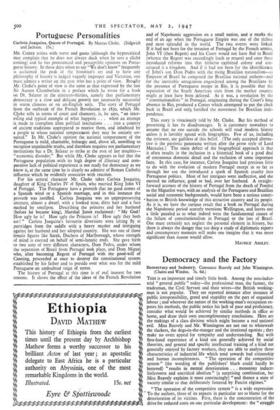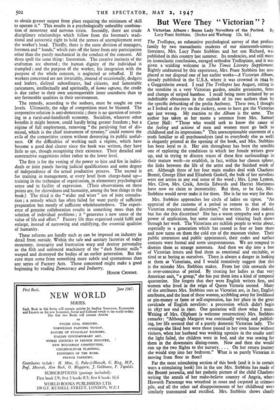Democracy and the Factory
Democracy and Industry. Constance Reavely and John Winnington. (Chatto and Windus. 7s. 6d.) Tins is an important and timely little book. Among the non-indus- trial " general public " today—the professional man, the farmer, the tradesman, the Civil Servant and their wives—the British working- man is not popular. They see reported instance after instance of public irresponsibility, greed -and stupidity on the part of organised labour; and wherever the nature of the working-man's occupation ex- poses his methods, the public notice his lack of pace and proficiency, consider what would be achieved by similar methods in office or home, and draw their own uncomplimentary conclusions. Here are the makings of a class division which might become a real national evil. Miss Reavely and Mr. Winnington are not out to whitewash the slackers, the dogs4n-the-manger and the irrational egotists ; they make no overt appeal for sympathy and understanding. But with first-hand experience of a kind not generally achieved by social theorists, and general and specific intellectual training of a kind not generally enjoyed by factory workers, they are able to analyse those characteristics of industrial life which tend towards bad citizenship and human incompleteness. " The operation of the competitive system" (the wording of the publishers' blurb could hardly be bettered) " results in mental deterioration . . . monotony induces listlessness and uncritical idealism" (a surprising combination, but Miss Reavely explains it most convincingly) " and thence a state of vacuity similar to that deliberately fostered by Fascist regimes."
" The operation of • the competitive system " is a wide expression. To the authors, three of its aspects in particular are to blame for the deterioration of its victims. First, there is the concentration of the drive for reduced costs on one particular development : the " struggle to obtain greater output from plant requiring the minimum of skill to operate it." This results in a psychologically unhealthy combina- tion of monotony and nervous strain. Secondly, there are crude disciplinary relationships which follow from the foreman's tradi- tional and autocratic right to hold the terrors of unemployment over the worker's head. Thirdly, there is the caste division of managers, foremen and " hands," which cuts off the latter from any participation other than the purely mechanical in the conduct of the concern. All three spell the same thing: frustration. The creative instincts of the craftsman are aborted ; the human dignity of the individual is trampled ; and the purpose df the worker, his integration with the purpose of the whole concern, is neglected or rebuffed. If the workers concerned are not invariably, instead of occasionally, dodgers and loafers, disloyal subordinates, bad citizens, and lamentable caricatures, intellectually and spiritually, of homo sapiens, the credit is due rather to their own unconquerable inner soundness than to any favourable qualities in their environment.
The remedy, according to the authors, must be sought on two levels. Ultimately, the edge of competition must be blunted. The corporative solution is anti-democratic ; there is no question of revert- ing to a rural-and-handicraft economy. Socialism, whatever other benefits it might bestow, could hardly bring greater freedom ; but a regime of full employment, removing " the paralysing fear of dis- missal, which is the chief instrument of tyranny," could remove the evils of the competitive system without destroying its public useful- ness. Of the difficulties of working such a regime, which have become a good deal clearer since the book was written, they have little to say, though recognising their existence. Their detailed and constructive suggestions relate rather to the lower level.
The first is for the vesting of the power to hire and fire in indivi- duals or joint panels having judicial qualifications and some degree of independence of the actual productive process. The second is for training in management, at every level from charge-hand up— training in the technique of organisation, in elementary psychological sense and in facility of expression. (Their observations on these points are, for shrewdness and humanity, among the best things in the book.) The third is the " wider and wiser " use of joint consulta- tion ; a remedy which has often failed for want partly of sufficient preparation but mostly of sufficient wholeheartedness. The experi- ence of genuine collaboration results in something more than the solution of individual problems ; it " generates a new sense of the value of life and effort." Factory life thus organised could fulfil and enlarge, instead of narrowing and stultifying, the essential qualities of humanity.
These reforms are hardly such as can be imposed on industry in detail from outside. Within the safe and sanitary factories of today monotony, insecurity and frustration warp and destroy personality as the filth and unfenced machinery of the " dark Satanic mills " warped and destroyed the bodies of an earlier generation. But the cure must come from something more subtle and spontaneous than any series of Factory Acts. Those concerned might make a good beginning by reading Democracy and Industry. HONOR CROOME.



































 Previous page
Previous page